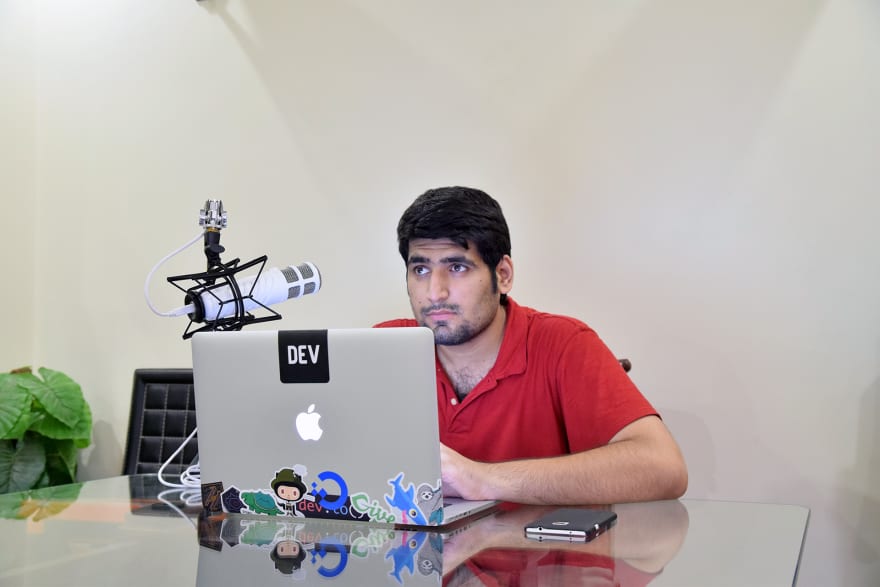Hey, folks!
This is Ahmad Awais — Full Stack Web Dev & Regular WordPress Core Contributing Developer. I love the Dev.To() community and have been a fan of what Ben has built here. Long time reader, now trying to get more involved here.
I have always been a teacher, but quite recently I have invested heavily in and have become serious about online teaching. And have started sharing the insights in a newsletter called The WordPress Takeaway!
I have bought
- Rode Podcaster
- Rode PSA1 Boom Arm
- Rode PSM1 Shock Mount
I am also building a few info-products and launching a web course (on a custom built online teaching platform — that I have over-engineered IYWIM 😂).
Right now, looking into what can be done to improve the Audio post processing. I have access to Adobe Audition and have started building custom presets already. I wanted to ask what is your audio post-processing setup for podcasting and online teaching.
Looking forward!







Top comments (11)
I host The Women in Tech Show thewomenintechshow.com
2 Mics: Audio-Technica ATR2100-USB Cardioid Dynamic USB/XLR Microphone
Remote recorder: zencastr
Portable recorder: ZoomH4 pro
Remote guest mics (most of the time): apple earbuds
I edited some shows using Garage Band. Then I requested shows to be edited on Fiverr (I didn't ask what software they used).
My new editor is using Adobe Audition. He studied audio production.
Well, since I posted this thread. I have learned Adobe Audition a lot. Mike Russel's tutorials have gone far and beyond in helping me get there youtube.com/user/musicradiocreativ....
Here's the latest audio test that I did and I think it is pretty good → youtu.be/7NgJcTtQoNg
Cheers!
I've heard good things about Adobe Audition and Audacity.
I don't know much about post-processing, but a podcaster I listen to on and off on Youtube has a list of his resources: Lewis Howes' Setup
Maybe podcasters you like would be willing to share their setups with a DM on Twitter/whatever social media? I've always found that people are more than willing to help someone get started :)
Thanks for the reaponse @andy !
That's actually what I am doing at the moment. Have received a few good responses already!
Awesome! That's super exciting!
I don't have a lot of expertise in this area, especially on post-processing, but I use and like Blue Snowball (great value) for recording and have participated on podcasts that use Zencastr and it was a great experience in addition to being the choice for high quality recording.
Not sure what "post-processing setup" means exactly, but as a public radio-cum-podcast person I can give you some insight into what tools I think are more useful in the "Okay I'm done recording, now what" stage.
A) I do almost all of my work in the stupidly expensive but extremely robust Pro Tools. That is not going to useful to most people here, but it's probably worth mentioning. Other worthy (cheaper) editing programs include the Pro Tools-esque Reaper (which is technically $250, but you can use it for free as long as you want) and the very low-tech, podcast-centric Hindenburg (which I think is maybe $10?). Audacity technically it counts as editing software, but it's more useful as ancillary software (changing sample rates, separating stereo files, etc.)
B) Audio Hijack is a must, the only thing I trust for grabbing archival sounds from YouTube, etc. You can get really creative with it too by recording system audio. Has some limitations, doesn't do what you'd expect with Skype so I record online calls through Google Hangouts.
C) The best audio conversion software is called Switch, it's ~$40, totally worth it. Offers a huge amount of control over your conversion of audio files, much more than any editing program's export feature.
D) Trint is a cool automated transcription software that is somewhere in the 75% accuracy zone. A good manual transcription program is InqScribe, which I think costs like $100 but is still useful as a trial version. Let's you control variable playback speed with shortcut keys and insert timestamps really easily.
Lastly, not sure if this is what you're talking about but I always apply a limiter at the end of everything I publish. The settings will change, but what you're trying to do is make the whole sound a little bit more even by making sure nothing is too loud. I also try to use it to boost the volume just a little bit. Having Something too loud is annoying yet easy to fix, but having something too quiet is worse IMO.
Oh and ALWAY cut 100Hz and below from whatever voice you record. Some mics have this feature built into the physical thing, but if not use a simple EQ. No reason to have human bass frequencies that low.
Great suggestions man! I will look into these software! Interesting!
A lot can be done with a good microphone and a quiet environment, but when you want that extra bit of quality in post production I recommend nonoisy It does post production for you automatically. Background noise is removed and the volume is leveled.
You'd be amazed by the upgrade to Rode Podcaster and Adobe Audition. Thanks for your input. Def some new software to look into.
I did save up for quite some time to buy that one! Amazon won't ship it here so there was $160 more on shipment :( Sigh!